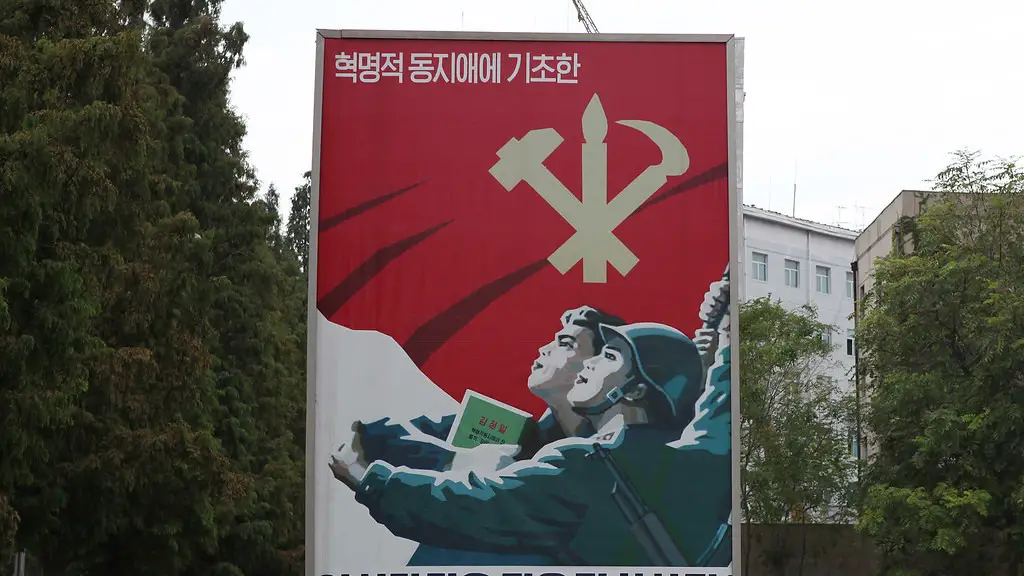Historical Background
Before the end of World War II in 1945, the Korean peninsula was part of the Japanese empire. But after Japan surrendered, the United States and the Soviet Union decided to divide the peninsula into two, placing the 38th parallel as a line of demarcation. This led to the creation of two separate states: the Communist-led Democratic People’s Republic of Korea (North Korea) and the US-backed Republic of Korea (South Korea).
Due to the Cold War politics and rivalry between the US and the Soviet Union, the two states went their separate ways. While South Korea adopted a pro-democratic and market-oriented system, North Korea adopted a Stalinist and dictatorial model.
Ideological Division
North and South Korea had different ideologies. North Korea embraced the concepts of socialism and totalitarianism, whereas South Korea embraced capitalistic principles, democracy, and human rights. As the two sides had different ideas on how society should be organized, they were not able to form a single unified state.
The ideological divide was further exacerbated by the end of the Korean War in 1953, when the two sides failed to reach an agreement on reunification. This led to the countries remaining separated and the ideological gulf between them continuing to widen.
The political divisions between the two states were further cemented by the outbreak of the Cold War, which saw North Korea ally itself with the Soviet Union and South Korea ally itself with the United States.
Military Conflict
The differences between North and South Korea escalated into a military conflict in 1950, when North Korea launched an invasion of South Korea. United Nations forces intervened and eventually drove the North Korean forces back. But despite the intervention, the two sides remained at war, as no peace treaty was ever signed.
There have been numerous military standoffs between North and South Korea over the years. North Korea has been accused of launching guerrilla attacks and infiltrating spies across the border. The South has responded with a robust military presence along the border, preventing any further incursions by the North.
International Economic Impact
The separation between North and South Korea has had an economic impact on the two countries as well. North Korea has remained largely closed off to the international community and has suffered economically as a result. South Korea on the other hand has pursued a more open economy and has become one of the most economically successful countries in the world.
Political Implications
The separation of North and South Korea has had a profound political impact as well. North Korea is widely viewed as a dictatorship and is subject to numerous international sanctions. The North has also pursued a foreign policy of isolationism, refusing to have diplomatic relations with certain world powers. South Korea, on the other hand, has been able to pursue a policy of engagement with the international community and is an important ally of the United States.
The North and South are still technically at war and have been unable to agree on a formal peace treaty. Despite a few attempts at negotiations, the differences between the two sides have proven to be too wide and a deal has been impossible to reach.
Alternative Strategies
Recently, both North and South Korea have expressed an interest in pursuing a peaceful resolution to the conflict. South Korea has expressed its willingness to bring the North into the modern world and has even proposed economic cooperation as a way to bring the two sides closer together. The North has also expressed a willingness to engage in dialogue, although there has been little real progress on the issue.
There has also been talk of a reunification between the two countries. This would involve both sides setting aside their differences and agreeing to form a single unified state. This would be an incredibly difficult process, but it could provide an opportunity for improved relations between the two nations.
Reactions from Other Nations
Other nations have largely been in support of reunification efforts, although it is important to note that there have been voices in favor of maintaining the separation. China, for instance, has expressed its support for reunification but has also expressed concerns about the impact it would have on regional stability.
The United States has also voiced its support for reunification and has urged both sides to work towards their common goal. However, the US has also made it clear that it would only support a process that respects the autonomy of both nations.
Economic Implications
The economic implications of a reunified Korea would be immense. For starters, reunification would open up a vast market for businesses, providing them with new opportunities for growth. It would also provide economic stimulus to the region, with an influx of investment and development.
Reunification would also reduce the economic burden on both countries, as they would no longer have to invest in the tools and resources needed to guard their respective borders. This could free up resources for more productive activities, such as investing in infrastructure and education.
Political Implications
Reunification would also involve a major political transformation. It would involve both sides setting aside their differences and agreeing to form a single government. This would be a difficult process, as the two sides have become increasingly hostile and distrustful of one another over the years. But with the right policies and leadership, it could provide an opportunity to build a new and prosperous nation.
Reunification would also have international implications, as it would involve both North and South Korea coming back into the international community. This could have a significant impact on global politics, potentially reducing tensions between certain powers and bringing greater stability to the region.
Conclusion
The separation of North and South Korea has had a profound impact on both countries and the region as a whole. While reunification could present a unique opportunity for both countries to come together, it would involve a difficult process of compromise and negotiation. However, with the right leadership and policies, it is possible that this could happen eventually.




